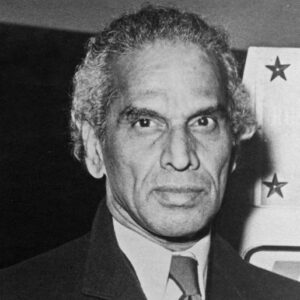V.K. Krishna Menon was one of India’s most successful and aggressive diplomats and politicians. He was smart, direct, and very bright. He held several top jobs and was a close political friend of the Prime Minister at the time, Jawaharlal Nehru. He had so much power that it is not surprising that the magazine “Time” named him the second most powerful person in India, after the Prime Minister at the time, Nehru. That was how much power he had. He was very outspoken, and if he thought he was right, he would say things that were not politically correct. He was often seen as a brave defender of India in the West, where he never missed a chance to speak out and defend his home country. He had been India’s High Commissioner to the United Kingdom and the country’s Defense Minister. He was very smart and worked hard. As a young man, he took part in India’s movement for independence and started the India League in London to get people to support the cause. He was a strong-willed man who loved his country very much. He spent his whole life serving his country.
Early years and childhood
He was born in Kerala to a family of money and power. His father, Komath Krishna Kurup, was a well-known and wealthy lawyer, and his mother came from a well-known and wealthy family as well.
His early education was done at Zamorin’s College in Kozhikode. After that, he went to Presidency College in Chennai, where he got a B.A. in History and Economics in 1918.
He then went to Madras Law College, where he became interested in theosophy. Annie Besant put together a group called “Brothers of Service,” which he joined because he knew Annie Besant.
Annie Besant helped him move to London in 1924 so he could go to University College London and then the London School of Economics to get a better education.
In 1930, he got an M.A. with First Class Honors in psychology. In 1934, he got an M.Sc. in political science.
Krishna Menon’s Career
In the 1930s, he worked for “Bodley Head” and “Twentieth Century Library” as an editor. In 1935, he added work with Penguin and Pelican Books to his list of publishing jobs.
He believed in socialism and joined the Labour Party in England. From 1934 to 1939, he was a Labour councilor for the Borough of St. Pancras. In 1939, he was getting ready to run for office from the Dundee Parliamentary constituency, but the plan fell through.
From 1944 to 1947, he was again a Labour councilor. In 1944, he started the St. Pancras Arts and Civil Council. The next year, he was put in charge of the Education and Public Library Committee.
During this time, he became friends with Jawaharlal Nehru, who was also a nationalist. This friendship would last for a long time, only ending when Nehru died.
Menon worked hard to make sure that Nehru would become a leader of the Indian independence movement and be chosen as India’s first Prime Minister after it won its independence.
After India got its independence in 1947, Menon became the high commissioner to the United Kingdom. He was in this job until 1952. He had always had a lot of mistrust for the United Kingdom, and British politicians also saw him as a threat.
In 1952, he was put in charge of the Indian group at the United Nations. He became very well-known for how smartly he solved difficult political problems. He worked in this job until 1962. During that time, he worked out a plan for peace in Korea and a truce in Indo-China.
Throughout the 1950s, he worked with Bertrand Russell to stop the spread of nuclear weapons, which he was strongly against.
He joined the Rajya Sabha in 1953 and became a Minister without Portfolio in the Union Cabinet in 1956. In 1957, he was made Minister of Defence, and even though there was a lot of opposition, he started to build a military-industrial complex at home.
On January 23, 1957, he spoke for eight hours at the UN Security Council to defend India’s position on Kashmir. The speech is still the longest one that has ever been given at the UN. Only when Menon passed out from exhaustion did the speech end.
After India lost the Indo-China War in 1962 to China, Menon’s role was heavily criticized, and he had to resign.
In 1967, he quit the Congress and ran for parliament as an independent. This was because the party wouldn’t give him a ticket from the North East Bombay constituency because he wasn’t from Maharashtra. But he didn’t get the job.
Menon ran for a seat in Parliament as an independent from the Midnapore constituency in West Bengal in 1969 and won.
In the 1971 parliamentary election, Menon ran for office in Trivandrum, which is in his home state of Kerala. He won.
Personal History and Legacies
Menon lived a very simple life, and he refused to get paid even when he was the high commissioner. He lived in a house with only one room, and he liked to take public transportation whenever he could. But when he went to social events, he was dressed to the nines. He didn’t drink or eat meat and never got married.
In 1974, when he was 78 years old, he died.
The V. K. Krishna Menon Institute was set up in 2006 to honor Menon’s life and accomplishments.
Estimated Net worth
In this section, we also talk about the disagreements. Krishna Kumar Menon is worth between $3 million dollars.
Trivia
A lot of people called this Indian diplomat “India’s Rasputin” or “Nehru’s Evil Genius.”


